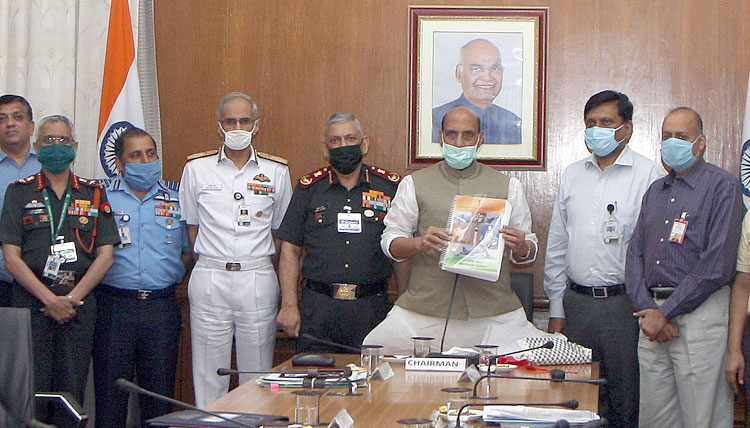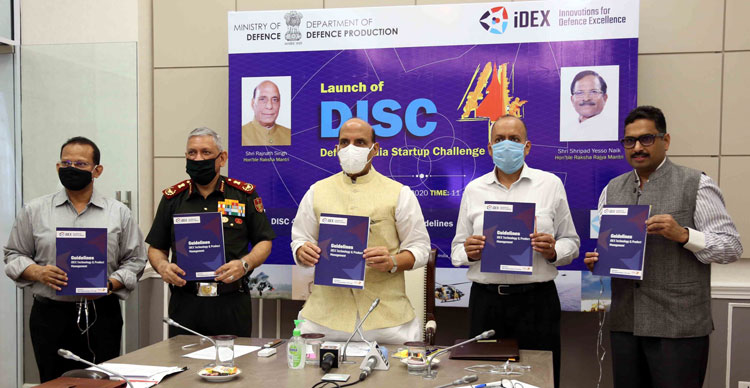INDIAN ARMED FORCES CHIEFS ON
OUR RELENTLESS AND FOCUSED PUBLISHING EFFORTS

SP Guide Publications puts forth a well compiled articulation of issues, pursuits and accomplishments of the Indian Army, over the years

I am confident that SP Guide Publications would continue to inform, inspire and influence.

My compliments to SP Guide Publications for informative and credible reportage on contemporary aerospace issues over the past six decades.
- Interim Defence Budget 2024-25 — An Analysis
- Union Defence budget 2024
- Indian Army: In quest of greater firepower and policy recommendations for gaps
- Indian Army Annual Press Conference 2024
- 6G will transform military-industrial applications
- Tata Boeing Aerospace Delivers 250 AH-64 Apache Fuselages, Manufactured in India
Defence Minister discloses the Defence Acquisition Procedure
The procedure largely aims to strengthen domestic industrialisation of the defence sector.

The Defence Acquisition Procedure (DAP) was released on Monday at the Defence Acquisition Council (DAC) meeting by Defence Minister Rajnath Singh. DAP will be applicable with effect from October 1, 2020, including many measures toenhance domestic industrialisation of the defence sector and strengthen the Make in India initiative. Procedures have also been simplified to reduce time delays and enhance the ease of doing business.
The first Defence Procurement Procedure (DPP) was promulgated in the year 2002 and has since been revised periodically to provide impetus to the growing domestic industry and achieve enhanced self-reliance in defence manufacturing. The Defence Minister had approved constitution of Main Review Committee under Chairmanship of DG (Acquisition) Apurva Chandra in August 2019 for preparation of DAP-2020, the official statement mentioned.
Happy to unveil the new Defence Acquisition Procedure (DAP)-2020 Document today. The Formulation of DAP 2020 has been done after incorporating comments and suggestions from a wide spectrum of stakeholders. pic.twitter.com/quRiyAKY3W
— Rajnath Singh (@rajnathsingh) September 28, 2020
Formulation of DAP 2020 has happened over more than a year, incorporating comments and suggestions from a wide spectrum of stakeholders. Multinational professional services network, KPMG has been recognised as a key stakeholder whose inputs were considered and incorporated in the latest iteration of the subject policy. We thank you for sharing your valuable inputs.
“The DAP 2020 has been aligned with the Prime Minister’s vision of empowering the Indian domestic industry the ultimate aim of turning India into a global manufacturing hub. With the new Foreign Direct Investment policy announced, the DAP 2020 has adequately included provisions to encourage FDI to establish manufacturing hubs both for import substitution and exports while protecting the interests of Indian domestic industry,” the Defence Minister stated.
“Defence Acquisition Council headed by Raksha Mantri Rajnath Singh accords approval for various arms and equipment worth 2,290 crore,” tweeted A. Bharat Bhushan Babu, Principal Spokesperson, Ministry of Defence, Government of India.
For a self-sustained Defence sector
“The DAP 2020 has been aligned with the Prime Minister’s vision of empowering the Indian domestic industry the ultimate aim of turning India into a global manufacturing hub. With the new Foreign Direct Investment policy announced, the DAP 2020 has adequately included provisions to encourage FDI to establish manufacturing hubs both for import substitution and exports while protecting the interests of Indian domestic industry,” the Defence Minister stated.
The DAP 2020 has been aligned with the Prime Minister Shri @narendramodi’s vision of Atmanirbhar Bharat and empowering the Indian domestic industry through Make in India initiative with the ultimate aim of turning India into a global manufacturing hub.
— Rajnath Singh (@rajnathsingh) September 28, 2020
Some specific reforms have been enunciated in Atmanirbhar Bharat Abhiyan, to be incorporated including relevant incorporation in the DAP to ensure that no equipment as mentioned in the list is procured ex import post timelines notified.
To facilitate indigenisation of imported spares, Request for Information (RFI) stage will explore willingness of the prospective foreign vendors to progressively undertake manufacture and setup an indigenous eco system at the spares/sub component level.
A new category of Buy (Global – Manufacture in India) which incorporates ‘manufacture of either the entire/part of the equipment or spares/assemblies/sub-assemblies/Maintenance, Repair and Overhaul (MRO) facility for the equipment, through its subsidiary in India.
The categories of Buy(Indian-IDDM), Make I, Make II, Production Agency in Design & Development, OFB/DPSU and SP model will be exclusively reserved for Indian Vendors meeting the criteria of Ownership and Control by resident Indian citizens.
— Rajnath Singh (@rajnathsingh) September 28, 2020
The procedure also enables establishment of co-production facilities to achieve ‘Import Substitution’and reduce life cycle cost as well as contractual enablement aiding the buyer’s right to optimise life cycle support costs and system enhancements through indigenous eco system incorporated.
The DAP 2020 also focuses on FDI in defence manufacturing and indigenisation of the manufacturing prices. “As part of the Defence Reforms announced in the Atmanirbhar Abhiyan, setting up of a project management unit (PMU) has been mandated to support contract management. The PMU will facilitate obtaining advisory and consultancy support in specified areas to streamline the acquisition process,” the statement said. This is being done to ensure a time bound defence procurement process and faster decision making.
The procedure also enables establishment of co-production facilities to achieve ‘Import Substitution’ and reduce life cycle cost as well as contractual enablement aiding the buyer’s right to optimise life cycle support costs and system enhancements through indigenous eco system incorporated.
The process of formulation of SQRs has been further refined with greater emphasis on identifying verifiable parameters based on analysis of ‘Comparative’ equipment available in the global and domestic markets. DAP 2020 also emphasises the need to conduct trials with an objective to nurture competition based on the principles of transparency, fairness and equal opportunities to all and not as a process of elimination.
Enhancing the ease of doing business
“One of the key focus areas of the review was to implement ‘Ease of Doing Business’ with emphasis on simplification, delegation and making the process industry friendly with certain specific provisions incorporated,” said the official statement.
Certain procedural changes suggested in the procedure document include single stage accord of Acceptance of Necessity (AoN) in all cases up to 500 crores has been instituted thereby reducing time.FTP cases, post accord of AoN, will be progressed as per delegated powers thereby reducing the procurement cycle considerably.
In planning process, Long Term Integrated Perspective Plan (LTIPP) has been re-designated as Integrated Capability Development Plan (ICDP) covering planning period of ten years instead of 15 years.
Certain procedural changes suggested in the procedure document include single stage accord of Acceptance of Necessity (AoN) in all cases up to 500 crores has been instituted thereby reducing time.
Certain measures to provide clarity and alignment of requirements as also enabling provisions have been incorporated in the Request for Proposal (RFP) and Standard Contract Document (SCD) in terms of Flow Chart driven guidelines, provision of in-storage preservation and termination of contracts in cases where projects are not progressing as per pre–defined milestones.
Facilitating Making and Innovation
Three categories have been mentioned in the document for production as Make I, Make II, and Make III.
For Make I (Government Funded upto 70%), the procedure lays down a cap of 250 crore/DA and selection of DAs based on bidding criteria. While Make II (Industry Funded) is for production of indigenously designed & developed weapons/equipment/systems/platforms along with sub components/assemblies, and Make III (Indigenously Manufactured) category for manufacture of equipment/platforms or spares/assemblies/sub-assemblies for enabling import substitution.
The DAP 2020 also states that the procurement of prototypes developed through ‘Innovation’ under various initiatives like iDEX, Technology Development Fund and Internal Services Organisations has been facilitated.
“A new procedure has been included as a new chapter in DAP and structured as an enabling provision for Services to procure essential items through Capital Budget under a simplified procedure in a time bound manner,” stated Singh.
“A new procedure has been included as a new chapter in DAP and structured as an enabling provision for Services to procure essential items through Capital Budget under a simplified procedure in a time bound mannerThe Offset guidelines have also been revised, wherein preference will be given to manufacture of complete defence products over components and various multipliers have been added to give incentivisation in discharge of Offsets,” stated Singh.
Some other salient features of DAP 2020 are as follows:
- Reservation of categories for Indian vendors to provide exclusivity in participation to domestic Indian industry. Certain categories of procurement namely, Buy (Indian-IDDM), Make I, Make II, Production Agency in Design & Development, OFB/DPSU and Strategic Partnership model will be exclusively reserved for Indian Vendors meeting the criteria of Ownership and Control by resident Indian Citizens with FDI not more than 49%.
- Overall enhancement of indigenous content (IC) as well as their verification has been looked into. A simple and practical verification process has been instituted and IC will now be calculated on ‘Base Contract Price’ i.e. Total Contract Price less taxes & duties.
- There is also a mention to promote use of indigenous military material with provisions for examination of platforms and other equipment/ systems and reward for vendors for using indigenous raw material.
- DAP 2020 also includes a provision for exploring options for operating base applications like Fire Control System, Radars, Encryption, Communications etc. on indigenous software in Buy (Indian- IDDM) & Buy (Indian) cases.
- The trial and testing procedures have been rationalised and their scope has been reduced. To avoid duplication of trials, waiver will be granted based on Certificates of Conformance. Requisite opportunity will be afforded to participating vendors to rectify shortcomings/faults during the Trials with permission to carry out repairs
- A separate dedicated chapter has been incorporated in the DAP 2020 for acquisition of systems Designed and Developed by DRDO/DPSUs/OFB. A simplified procedure with Integrated Single Stage Trials to reduce timelines and laying greater emphasis on evaluation through certification and simulation. Aspects of Spiral Development have also been incorporated.
- Certain voids existing in the previous policy have been addressed in DAP 2020 like peculiar issues related to procurement of Information Communication Technology (‘ICT’) intensive equipment and post contract management.
| Ser No | Category | DPP 2016 | DAP 2020 |
|---|---|---|---|
| (i) | Buy (Indian-IDDM) | Min 40% | Min 50% |
| (ii) | Buy (Indian) | Min 40% | Indigenous design – Min 50% Otherwise – Min 60% |
| (iii) | Buy & Make (Indian) | Min 50% of Make | Min 50% of Make |
| (iv) | Buy (Global – Manufacture in India) | - | Min 50% of Buy plus Make |
| (v) | Buy (Global) | - | Min 30% for Indian vendors |
Source: PIB
The statement mentioned that in fact, DAP 2020 which has been formulated post interactions over a year, is an enabler & industry friendly procedure aligned with Government of India’s vision of Atmanirbhar Bharat & impetus to Make in India. “DAP 2020 document instills a confidence and will meet aspirations of stakeholders across the spectrum.”
On Tuesday, September 29, 2020, the Defence Minister also attended the launch of Defence India Startup Challenge (DISC 4), “iDEX4Fauji” initiative and Product Management Approach (PMA) guidelines.

“Each of these initiatives will help the iDEX-DIO to scaleup the programme qualitatively and quantitatively. The Startup ecosystem and innovation, both enjoy a symbiotic relationship, they both thrive in the other’s presence. We need constant endeavour for innovation, evolution and sustenance of technological excellence in Armed forces through support of Academia, innovators & startups,” he stated.
A healthy Defence startup ecosystem is the right prescription towards maintaining India’s strategic autonomy. Glad to attend the launch of Defence India Startup Challenge and ‘iDEX4Fauji’ initiative. Watch https://t.co/9yXK1I0iyc
— Rajnath Singh (@rajnathsingh) September 29, 2020





